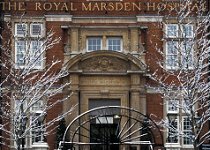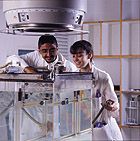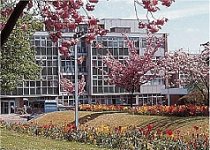
About Us
Objective of the Fund
 The
objective of the Fund is the promotion of clinical and laboratory research
into the treatment and possible cure of leukaemia and allied diseases. The
objective of the Fund is the promotion of clinical and laboratory research
into the treatment and possible cure of leukaemia and allied diseases.
A popular aim of the BFLF is to support the Leukaemia/Myeloma Unit
at the Royal Marsden Hospital.
We specifically aim to support research into a particular aspect of
cause, diagnosis or treatment of leukaemia and assisting with the
dissemination of knowledge into the causes, diagnosis and treatment of
leukaemia.
The Fund also aims to provide support for patients and to improve
the environment for patients with these diseases.
All applications are considered at the discretion of the Executive
Committee on their merits.
Grants are not normally made to other charities or major fund
raising appeals or to individuals.
Research aims
Although treatment is now more
successful for leukaemia, with significant numbers of patients being cured,
there are still a substantial number of patients that relapse. The Bud
Flanagan Leukaemia Fund aims to develop and introduce new treatments for
these diseases. It is only by doing this that we will be able to improve
patient outcomes and cure.
Projects
funded
Within the criteria defined by the Executive Committee for making
grants, the following projects have been recently funded:
The Royal Marsden Hospital: Bone Marrow Transplant Unit
 The
Fund recognises the importance of providing support for patients
during their treatment. The treatments are often prolonged and
require long periods of in patient stay. It was for these reasons
that the Fund contributed over a million pounds to the refurbishment
of the Bone Marrow Transplant Unit, paying particular attention to
the environment and surroundings for patients undergoing these
treatments. The
Fund recognises the importance of providing support for patients
during their treatment. The treatments are often prolonged and
require long periods of in patient stay. It was for these reasons
that the Fund contributed over a million pounds to the refurbishment
of the Bone Marrow Transplant Unit, paying particular attention to
the environment and surroundings for patients undergoing these
treatments.
The specialised environment reduces the risk of infections, but also
improves the quality of life for these patients while they are on
treatment.
Sharon West, Consultant Nurse Specialist, says:
“The Bud Flanagan Unit enables patients to be nursed
in single rooms which offers patients more privacy with all the
rooms having ensuite facilities. The rooms also have fridges and
televisions with DVD players and computers with internet access and
webcams allowing contact with friends and family. There are 2
negative pressure rooms where we can treat patients with respiratory
and other infections.
Infection control procedures have been reviewed and this means that
patients are allowed to have more than one visitor at a time;
previously they could only have one named visitor in the room at any
one time, and other visitors had to talk to patients through a
plastic window. Nurses and visitors no longer had to gown up with
protective clothing and we now only wear aprons. We can do more
transplants as we have more single rooms and there is the facility
for relatives to stay but only when the patient is acutely unwell”.
The Royal Marsden
Hospital: New Drugs
The Fund has directly provided support for the Drug Development
Programme in the Haematology Unit at The Royal Marsden Hospital.
In particular, money from the Fund has been used to develop a team
who can evaluate new drugs, ‘small molecules’, which often lack the
severe toxicity of prior chemotherapeutic regimens. The Fund
considers this to be an important area to support as it gives hope
to people with otherwise incurable disease. It provides an
effective way of improving the care of these patients, and it is in
this fashion that new treatments for patients can be developed that
lack the toxicity of other approaches.
The Royal Marsden
Hospital: Database Development
 The
Fund has supported the establishment of an evaluation of the value
of current treatments for cases treated in the Haematology Unit.
This has been done in conjunction with the Fergus McClay Database
and the
Jenny Bidwell Database. The data that has been
collected includes the nature and type of disease, the treatment
given, and the outcomes achieved. This is a very simple, but
highly effective way of making improvements in treatment. By
analysing this data we can understand which patients responded best
to which treatments and this information provides a data driven way
of selecting the best treatment for any individual patient.
This, combined with recruitment into clinical trials, means that we
should rapidly make progress in the delivery of effective
treatments, and improvement in cure rates. The
Fund has supported the establishment of an evaluation of the value
of current treatments for cases treated in the Haematology Unit.
This has been done in conjunction with the Fergus McClay Database
and the
Jenny Bidwell Database. The data that has been
collected includes the nature and type of disease, the treatment
given, and the outcomes achieved. This is a very simple, but
highly effective way of making improvements in treatment. By
analysing this data we can understand which patients responded best
to which treatments and this information provides a data driven way
of selecting the best treatment for any individual patient.
This, combined with recruitment into clinical trials, means that we
should rapidly make progress in the delivery of effective
treatments, and improvement in cure rates.
The Royal Marsden
and Institute of Cancer Research:
Cancer Fingerprinting and Personalised Medicine
 Everybody’s
cancer is different and as we develop new treatments, it is
important to select treatments that work for an individual patient
and have the fewest side effects. The Fund believes that this
is the best way to improve survival and outcomes for patients in the
short term. Consequently, the Fund has invested in developing
fingerprinting technologies based on ‘gene-chips’, able to
characterise individual cancers. Complex computer programmes
can be used to analyse the data for these ‘Chips’ giving a
characteristic signature for the cancer. This signature is
then matched to the treatments available for the treatment of that
cancer subtype. Everybody’s
cancer is different and as we develop new treatments, it is
important to select treatments that work for an individual patient
and have the fewest side effects. The Fund believes that this
is the best way to improve survival and outcomes for patients in the
short term. Consequently, the Fund has invested in developing
fingerprinting technologies based on ‘gene-chips’, able to
characterise individual cancers. Complex computer programmes
can be used to analyse the data for these ‘Chips’ giving a
characteristic signature for the cancer. This signature is
then matched to the treatments available for the treatment of that
cancer subtype.
The Bud Flanagan Leukaemia
Fund
Administration:
by the Executive Committee & The General Secretary
Julie Rudland-Wood
10 Royal Sovereign View.
Eastbourne. BN23 6EQ
 The Bud Flanagan Leukaemia Fund The Bud Flanagan Leukaemia Fund
|